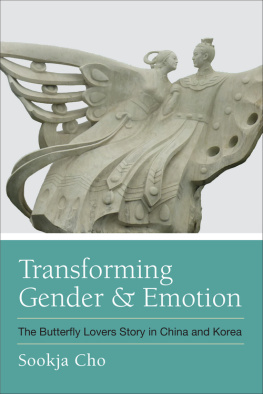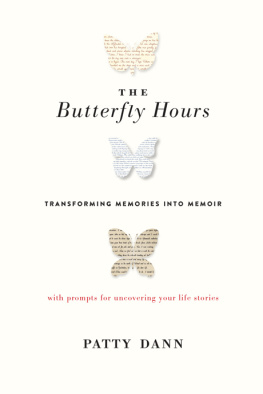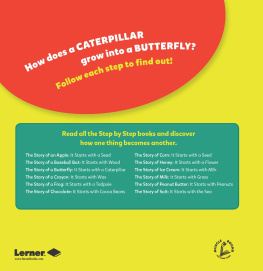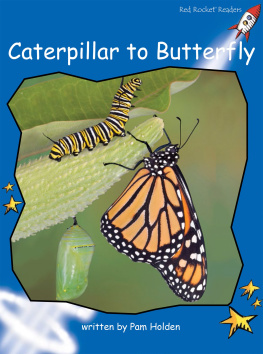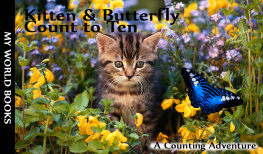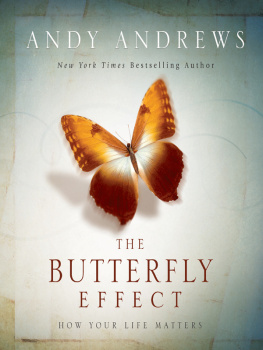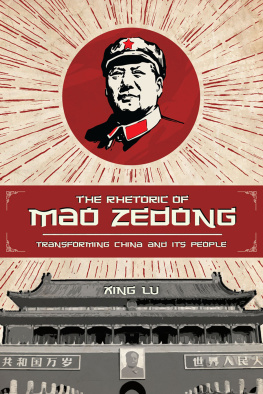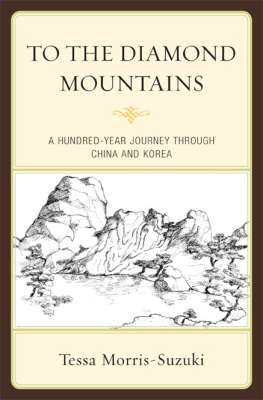Sookja Cho - Transforming Gender and Emotions: The Butterfly Lovers Story in China and Korea
Here you can read online Sookja Cho - Transforming Gender and Emotions: The Butterfly Lovers Story in China and Korea full text of the book (entire story) in english for free. Download pdf and epub, get meaning, cover and reviews about this ebook. year: 2018, publisher: University of Michigan Press, genre: Home and family. Description of the work, (preface) as well as reviews are available. Best literature library LitArk.com created for fans of good reading and offers a wide selection of genres:
Romance novel
Science fiction
Adventure
Detective
Science
History
Home and family
Prose
Art
Politics
Computer
Non-fiction
Religion
Business
Children
Humor
Choose a favorite category and find really read worthwhile books. Enjoy immersion in the world of imagination, feel the emotions of the characters or learn something new for yourself, make an fascinating discovery.
- Book:Transforming Gender and Emotions: The Butterfly Lovers Story in China and Korea
- Author:
- Publisher:University of Michigan Press
- Genre:
- Year:2018
- Rating:4 / 5
- Favourites:Add to favourites
- Your mark:
- 80
- 1
- 2
- 3
- 4
- 5
Transforming Gender and Emotions: The Butterfly Lovers Story in China and Korea: summary, description and annotation
We offer to read an annotation, description, summary or preface (depends on what the author of the book "Transforming Gender and Emotions: The Butterfly Lovers Story in China and Korea" wrote himself). If you haven't found the necessary information about the book — write in the comments, we will try to find it.
Sookja Cho: author's other books
Who wrote Transforming Gender and Emotions: The Butterfly Lovers Story in China and Korea? Find out the surname, the name of the author of the book and a list of all author's works by series.
Transforming Gender and Emotions: The Butterfly Lovers Story in China and Korea — read online for free the complete book (whole text) full work
Below is the text of the book, divided by pages. System saving the place of the last page read, allows you to conveniently read the book "Transforming Gender and Emotions: The Butterfly Lovers Story in China and Korea" online for free, without having to search again every time where you left off. Put a bookmark, and you can go to the page where you finished reading at any time.
Font size:
Interval:
Bookmark:
 Page i
Page i Sookja Cho
University of Michigan Press
Ann Arbor
Copyright 2018 by Sookja Cho
All rights reserved
This book may not be reproduced, in whole or in part, including illustrations, in any form (beyond that copying permitted by Sections 107 and 108 of the U.S. Copyright Law and except by reviewers for the public press), without written permission from the publisher.
Published in the United States of America by the
University of Michigan Press
Manufactured in the United States of America
A CIP catalog record for this book is available from the British Library.
Library of Congress Cataloging-in-Publication Data
Names: Cho, Sookja, author.
Title: Transforming gender and emotion : the Butterfly Lovers story in China and Korea / Sookja Cho. Description: Ann Arbor : University of Michigan Press, [2018] | Includes bibliographical references and index. Identifiers: LCCN 2017038272| ISBN 9780472130634 (hardcover : acid-free paper) | ISBN 9780472123452 (e-book)
Subjects: LCSH: Liang Shanbo yu Zhu Yingtai. | FolkloreChina. | FolkloreKorea.
Classification: LCC GR335.4.L53 C46 2018 | DDC 398.20951dc23
LC record available at https://lccn.loc.gov/2017038272
Legend says that these [butterflies] are
The transformations of the souls of the couple,
The red one being Liang Shanbo and the black one being Zhu Yingtai.
This kind of butterfly is ubiquitous,
Still being called Liang Shanbo and Zhu Yingtai.
Feng Menglong (17th-century China)
On a hot midsummer day, a little girl is crying,
Hiding under the shadow of flowers.
A yellow butterfly is flying around her and trying to sit on the edge of her hair ribbon.
The girl said, Im not a flower,
I dislike the flower that is withered by the cold wind after sunset.
I will not cry any more, and will fly like a butterfly.
Kim Sungon (1982, Korea)
Page vi Page viiTo my friend Park Chanyoung and her family
Page viii Page ixThis book is a direct result of the wonderful support I have received throughout the research and writing of it. I only now realize how ambitious I was when I started this project and how fortunate I have been since. My deepest gratitude goes to my advisors Beata Grant and Robert E. Hegel at Washington University in Saint Louis. They are my academic parents, heroes, and intellectual champions. They helped crystallize my interest in the cultural exchange between China and Korea and deserve any praise this study might earn. Without their limitless guidance and support this book could not have been completed. I am also grateful to Lingchei Letty Chen, Steven B. Miles, Lori Watt, and Jamie Newhard at Washington University, who served on my dissertation committee and offered many valuable suggestions for transforming my dissertation into a book.
This project has its origins in a trip to Zhejiang, China that I made in 2000 with my friend Park Chanyoung, to whom this book is dedicated. Despite being ill during that trip, Chanyoung took care of many details so that I could focus solely on exploring places related to the Butterfly Lovers story. Her enduring support and friendship, which began when we first met in college, gave me the will to complete this project.
I am also profoundly grateful to the two eminent Chinese scholars, Wang Zhaoqian and Cao Lin, who generously offered me their help but unfortunately left the world before they could hold this book in their hands.
At Arizona State University, I am grateful first of all to Sally Kitch at the Institute of Humanities Research and to Juliane Schober at the Center for Asian Research. They saw the value of this book and extended their full support for me to conduct extensive archival and field research in Asia and the US. This vote of expression of confidence from my own school, along with other invaluable support from the Association for Asian Studies, the Kyujanggak Page xii Institute at Seoul National University, and the Harvard Yenching Institute, were crucial to the completion of this project.
My special thanks go also to Nina Berman, director of the School of International Letters and Cultures at Arizona State, and to Anthony Chambers, Cynthia Tompkins, David William Foster, Hoyt Cleveland Tillman, Helene Ossipov, Juliann Vitullo, Markus Cruse, Daniel Gilfillan, Hilde Hoogenboom, Alvaro Cerron-Palomino, Miko Foard, Tomoko Shimomura, Anne Feldhaus, Pori Park, Aaron Moore, Jennifer Quincy, Qian Liu, and Henry M. Stevens. Each of these colleagues provided unstinting guidance, assistance, and encouragement.
I also would like to thank scholars at other universities, especially Allan H. Barr, Binbin Yang, Chan E. Park, Ji-Eun Lee, Jing Zhang, Joanna F. Handlin Smith, Kelly Yoojeong Jeong, Michael J. Pettid, Ross King, Richard D. McBride II, Ronald Egan, Sunyoung Park, Wilt L. Idema, Yanning Wang, and Zeng Yongyi. They provided valuable advice and criticism, and sent me any sources they thought might be helpful. In particular, the comments by Allan Barr, Joanna Smith, Kelly Jeong and Michael Pettid on earlier versions of this book and the sources provided by Wilt Idema and Jing Zhang were immensely helpful.
I also appreciate the many friends who read parts of the book at various stages. Burton Zhenwei Pu helped proofread my translations from the Chinese, while my friend and former colleague Tarah Demant and her associate Christine Bumpous critiqued the manuscript at its earliest stage. Molly Haight and Victoria R. M. Scott helped fine tune the later drafts, bringing to bear their long years of editing experience. I would also like to thank the two anonymous reviewers of my manuscript. Their intellectual acumen and constructive comments have been of great help. Finally, working with the University of Michigan Press has been a sheer joy. The book benefited greatly from the considerate and meticulous work of Elizabeth Frazier and Mary Hashman, and I am especially grateful to Editor Christopher Dreyer, who gave me the best support an author could hope to receive.
Last but not least, Id like to thank my professors and colleagues in Korea for their support on my path as a scholar. My heartfelt gratitude goes to the famous Chinese classics scholar Na Kapchu, with whom I studied the ancient Chinese classics beginning in my freshman year of college. I miss him so much, particularly his harsh criticism of my laziness and sloppinessIm still struggling with thisand his rare words of encouragement regarding my scholarly potential, both of which continue to echo in my ears decades Page xiii after his passing. Next in my thoughts are the professors and colleagues from my undergraduate and graduate studies and other venues related to my research: Liu Jong-Mok, Jung Jae-seo, Yi Chaedon, Yi Chongjin, Oh Soo-kyung, Lee Chang-Sook, Jung Min, Kim Usk, An Sangbok, Yi Chngjae, Hong Yngnim, Kim Sunhi, Shin Jeongsoo, Jeong Wook-jin, and Kim Seong-Kon (of the Literature Translation Institute of Korea). Though they were not directly involved in this project, their strong encouragement of my research only increased as time went by. In the same vein, I extend my special gratitude and profound respect to Liu Jong-Mok, my graduate advisor at Seoul National University, who showed me just how much a teacher can help a student. It was his infinite trust in my potential that laid the foundation for my studies and professional career in the United States.
Next pageFont size:
Interval:
Bookmark:
Similar books «Transforming Gender and Emotions: The Butterfly Lovers Story in China and Korea»
Look at similar books to Transforming Gender and Emotions: The Butterfly Lovers Story in China and Korea. We have selected literature similar in name and meaning in the hope of providing readers with more options to find new, interesting, not yet read works.
Discussion, reviews of the book Transforming Gender and Emotions: The Butterfly Lovers Story in China and Korea and just readers' own opinions. Leave your comments, write what you think about the work, its meaning or the main characters. Specify what exactly you liked and what you didn't like, and why you think so.

